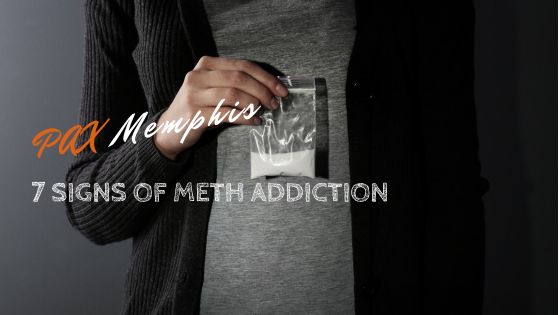Crystal meth is a central nervous system stimulant that causes tons of side effects, from increased energy and insomnia to loss of appetite and paranoia. Because of how addictive meth is, people tend to become dependent on it after only a few uses.
According to the National Institute on Drug Abuse (NIDA), 2.5 million people in the United States reported abusing meth in 2021.
Methamphetamine abuse can quickly lead to an addiction. If you believe your loved one is a meth user, there are signs to look out for. Some of the signs of meth addiction include unexplained weight loss, financial issues, meth mouth, and paranoid or violent behavior.
Here are 7 common signs of meth addiction.
1. Unexplained Weight Loss
One of the most common physical signs of meth addiction is significant and unexplained weight loss. If you notice that your loved one is beginning to lose tons of weight without dieting, working out, or having a medical condition, they could be abusing a drug like meth.
Meth is a stimulant, which means it speeds up your system while making you feel less hungry. This means that if you abuse meth, you will begin to lose weight rapidly. Unfortunately, one of the long-term effects of meth addiction is malnourishment from not eating enough and losing too much weight.
2. Insomnia or a Strange Sleep Schedule
As a stimulant, meth keeps you awake. It also increases your heart rate, blood pressure, breathing rate, and body temperature. This stimulation causes you to be unable to sleep.
If you notice that your loved one seems to be awake at all hours of the night, or has an erratic sleep schedule, they could be misusing meth. Meth users tend to stay high for long periods, which means they could go days without sleeping.
3. Skin and Dental Issues
If your loved one is abusing meth, they might develop skin issues. To explain, prolonged meth use cuts off circulation to the skin, which may lead to acne. Additionally, meth abuse can cause compulsive skin picking, which might cause your loved one to have painful sores on their face or body.
In addition to skin issues, meth abuse can lead to dental problems. Tooth decay from meth abuse is so common that it is often referred to as “meth mouth.” If your loved one’s teeth have rapidly declined in health, they might be abusing methamphetamine.
4. Paranoia
Meth abuse can cause both physical and psychological symptoms. One of the most prevalent mental health effects of meth use is paranoid behavior. If you notice your loved one peeking out of the windows, stressing that someone is out to get them, or begins to display unwarranted distrust in you, they could be high on meth.
Paranoid behavior from meth abuse can lead to aggressive or violent outbursts. As a result, you should always be careful when you believe your loved one is displaying paranoia from meth misuse. If they are displaying paranoia and mood swings, you should consider talking with them about seeking treatment for methamphetamine addiction.
5. Meth Paraphernalia
Meth can be smoked, snorted, or injected, so there are different types of paraphernalia associated with meth addiction. If you believe your loved one is addicted to meth, you should look out for meth paraphernalia around their home or on their person.
Common types of meth paraphernalia include:
- Burnt spoons that are used to cook meth before injecting
- Syringes or needles
- Belts, shoelaces, or lanyards are used to tie off before injecting
- Lighters used for smoking or cooking meth in a spoon
- Loose razor blades used to crush meth before snorting it
- Mirrors with scratch marks from crushing meth
- Straws or rolled-up dollar bills are used to snort meth
- Straight pipes with a bubble on the end
- Small plastic baggies that contain a crystalline substance
If you believe you have found meth paraphernalia in your loved one’s room, it’s time to contact an addiction treatment center. Meth addiction treatment programs can help your loved one overcome substance use disorders with a combination of therapy, group counseling, and relapse prevention planning.
6. Repetitive Behaviors
A common behavioral sign of meth addiction is engaging in repetitive behaviors. Since meth is a stimulant, it can lead to compulsive behaviors while a person is high. You might notice your loved one taking things apart just to put them back together, cleaning obsessively, or engaging in other repetitive and meaningless tasks.
7. Financial Issues
Lastly, meth addiction can become expensive. While small amounts of meth tend to be cheap, it is common to binge on the drug. This means your loved one will have to buy large amounts of meth at once or see their drug dealer multiple times each day.
Over time, meth addiction can lead to financial issues in a few different ways. First, buying meth can put a strain on your finances. Additionally, it can be hard to keep a job when you are addicted to meth.
If you notice your loved one selling their personal items or your own things at pawn shops or online, they could be struggling with financial issues from meth addiction.
Find Help for Meth Abuse and Addiction
Meth addiction is a chronic and progressive disease that must be treated professionally. Addiction treatment programs offer their clients evidence-based services to ensure that they receive the support they need.
PAX Memphis can connect you with a top-rated meth rehab center. Contact us today to get started.
Medically Reviewed: September 25, 2019

All of the information on this page has been reviewed and verified by a certified addiction professional.










